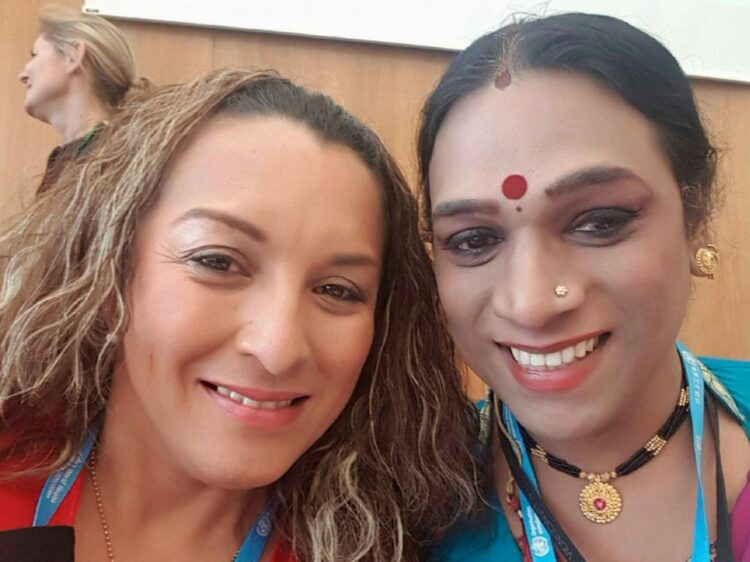We all know that the needs of transgender people have to be expanded, in particular for health interventions, as this community is vulnerable to non-communicable diseases. However, up to now, we have been treated as ‘invisible’ across the globe. We still lack data, research and epidemiological studies that could be used to demystify the best ways in which to provide quality healthcare to trans communities.
It is evident that transgender women are disproportionately affected by HIV, due to structural and gender barriers. Globally 19% of transgender women are living with HIV, with their chances of HIV infection 49% higher than other key populations[1]. HIV prevalence for transgender sex workers is on average nine times higher than for female sex workers and three times higher than for male sex workers[2].
These issues affecting the transgender population relate to various aspects that impact quality of life. Across the globe, data on transgender people and HIV is missing mostly due to the ignorance of researchers and data collectors, who mistakenly include transgender women as men who have sex with men (MSM), while excluding transgender men who have sex with me from the same category, along with a lack of political will to include transgender people as a separate key population category. Resources specifically for the transgender community are extremely low and are mostly used for service delivery rather than community empowerment.
Countries like India demonstrate the strong impact that structural community mobilization has on the empowerment of the local transgender population, which is reflected in judiciary reform, health care, social well-being and a more inclusive approach across society generally. However, there is a long way to go before we can claim success. While India is spearheading the global movement towards transgender empowerment, over the last five years the lack of political will and government refusal to engage in community engagement for policy reform has slowed the pace of improvements, particularly in relation to the social well-being of the transgender community in India. The Indian government has failed to roll out welfare policy reforms that are essential to the implementation of the progressive historic judgment on ‘third gender’ people[3]. However, our silver lining is the leadership demonstrated by civil society partners, community-based organizations, community advocates and individual trans allies who, alongside transgender activists, have helped to push transgender visibility, welfare and empowerment to the next level.
Today, India has evolved, as evidenced by the recent appointment of transgender activists as judges at Lok-Adalat (Public Hearing Courts)[4], transgender observers at the recently announced national upper house (Lok Sabha) elections[5], acceptance of transgender individuals as religious leaders[6], transgender-inclusive models within law enforcement agencies[7] and access to legal gender recognition through social reform[8]. This week, several transgender women from remote districts across India are tying the knot with men they have loved for many years in Chhattisgarh, Madhya Pradesh (north India), as well as adopting orphan children in order to offer them a better way of life[9].
The transgender movement in India is slowly recognizing transgender men, and recently a transgender man has been well-received by mainstream society as the first male openly transgender ‘bodybuilder’ [10]. Various corporations such as Godrej, Lalit Group of Hotels, Lemon Tree, and partners of Sodexo hiring agencies have come forward to prepare a ‘transgender manifesto’ to promote transgender inclusion in workplaces[11].
Although it feels like a golden era for transgender visibility and inclusion, we need to remember that, after IPC Section 377 (imposed during the colonization of the British Empire of India) was eliminated from Indian law on 6 September 2018[12], the push for equal civil rights for transgender people and other sexual minority is still a work in progress. We are not done yet, and we are definitely not on track until we have more policies that protect transgender people. Hate crimes and murders of transgender individuals are still major issues, so we need more investment in family support to protect transgender people from violence and death.

The National AIDS Control Organization (NACO), the World Health Organization (WHO), UNAIDS, and the UNDP, in their various documents, write extensively about gaps in transgender healthcare[13]. We are living in a time where such organizations are insisting that HIV prevention for transgender people must be broadened to include support for social and medical gender transition, protection against gender violence, government support for campaigns against transphobia, better HIV healthcare including administration of free or affordable PrEP & PEP services, and trans-aware and -inclusive welfare support.
India has important government elections upcoming this year that will affect, either positively or negatively, the ability of the transgender movement in India to reduce these structural barriers. Today, transgender people in India are claiming their space in decision-making, policy planning and welfare processes. In 2019, without any financial support, the transgender community across India mobilized themselves in Delhi to protest against the ‘transgender bill’ that was to be approved in the Rajya Sabha (Lower House) to become law[14]. This was the first time that the transgender community had organized to come together to fight for their rights.
I look forward to seeing the transgender movement in India become stronger in the years to come and to begin playing a vital role in deciding the outcome of India’s development as a country as a whole.
REFERENCES
[1]WHO 2019. World Health Organization HIV/AIDS Transgender People. [Online]. [30 March 2019]. Available from: https://www.who.int/hiv/topics/transgender/en/
[2]UN Joint Program on HIV/AIDS (UNAIDS). 2014. The Gap Report. [Online]. {30 March 2019]. Available from:http://files.unaids.org/en/media/unaids/contentassets/documents/unaidspublication/2014/UNAIDS_Gap_report_en.pdf
[3]BBC World News. 15 April 2014. India court recognises transgender people as third gender. [Online]. [30 March 2019]. Available from: https://www.bbc.co.uk/news/world-asia-india-27031180
[4]Geo TV News. 15 July 2018. India appoints its third transgender judge in Assam. [Online]. [30 March 2019]. Available from: https://www.geo.tv/latest/203335-india-trans-judge
[5]India Today. 22 March 2019. Lok Sabha polls: Transgender candidates coming to fore in Maharashtra politics. [Online]. [30 March 2019]. Available from: https://www.indiatoday.in/magazine/nation/story/20190401-transgender-candidates-lok-sabha-2019-maharashtra-1484014-2019-03-22
[6]BBC World News. 7 January 2019. India transgender gurus in landmark Hindu procession. [Online]. [30 March 2019]. Available from: https://www.bbc.co.uk/news/world-asia-india-46780219
[7]BBC World News. 14 June 2018. India transgender officer rejoins duty after rare show of support. [Online]. [30 March 2019]. Available from: https://www.bbc.co.uk/news/world-asia-india-44480495
[8]Human Rights Watch. 22 February 2018. India Gets Another Chance Protecting Transgender Rights. [Online]. [30 March 2019]. Available from: https://www.hrw.org/news/2018/02/22/india-gets-another-chance-protecting-transgender-rights
[9]News18. 15 February 2019. Defying All Odds, Man Marries Transgender on Valentine’s Day in Madhya Pradesh. [Online]. [30 March 2019]. Available from https://www.news18.com/news/india/defying-all-odds-madhya-pradesh-man-marries-transgender-on-valentines-day-2038183.html
[10]Scroll. 8 Dec 2018. Meet India’s first transman to become a bodybuilding champion. [Online]. [30 March 2019]. Available from: https://scroll.in/article/904632/meet-aryan-pasha-indias-first-transgender-male-bodybuilding-champ
[11]The Economic Times India. 10 December 2018. India Inc looks at wider LGBTQ inclusion. [Online]. [30 March 2019]. Available from: https://economictimes.indiatimes.com/news/company/corporate-trends/india-inc-looks-at-wider-lgbtq-inclusion/articleshow/67031560.cms
[12]The Times of India. 6 September 2018. Supreme Court decriminalises Section 377: All you need to know. [Online]. [30 March 2019]. Available from: https://timesofindia.indiatimes.com/india/sc-verdict-on-section-377-all-you-need-to-know/articleshow/65695884.cms
[13]UN Joint Program on HIV/AIDS (UNAIDS). 2014. The Gap Report. [Online]. {30 March 2019]. Available from:http://files.unaids.org/en/media/unaids/contentassets/documents/unaidspublication/2014/UNAIDS_Gap_report_en.pdf
[14]The Times of India. 29 December 2018. A fight to get it right: Hundreds protest ‘flawed’ transgender Bill. [Online]. [30 March 2019]. Available from: https://timesofindia.indiatimes.com/city/delhi/a-fight-to-get-it-right-hundreds-protest-flawed-transgender-bill/articleshow/67293664.cms






